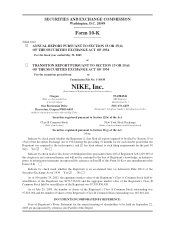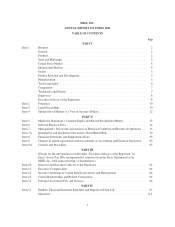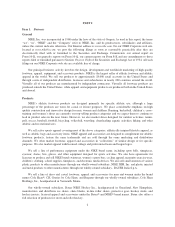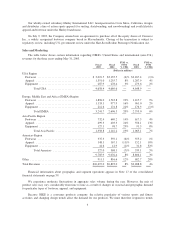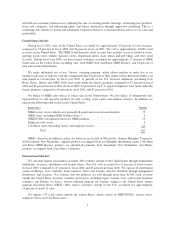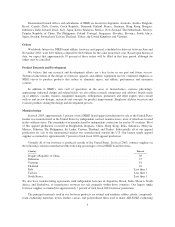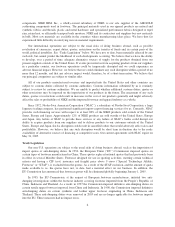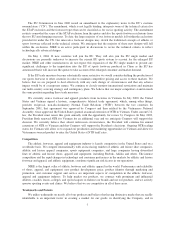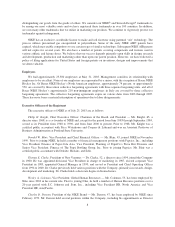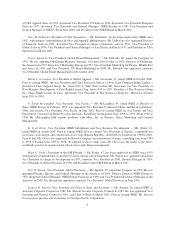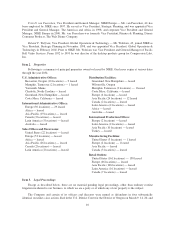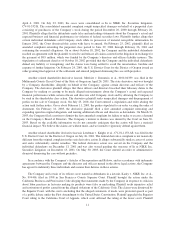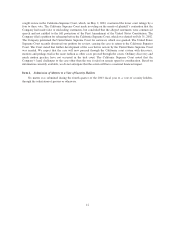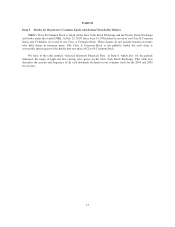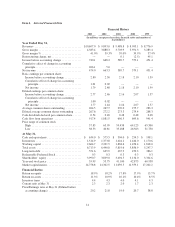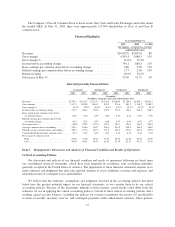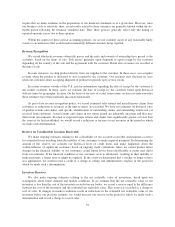Nike 2003 Annual Report Download - page 7
Download and view the complete annual report
Please find page 7 of the 2003 Nike annual report below. You can navigate through the pages in the report by either clicking on the pages listed below, or by using the keyword search tool below to find specific information within the annual report.components. NIKE IHM, Inc., a wholly-owned subsidiary of NIKE, is our sole supplier of the AIR-SOLE
cushioning components used in footwear. The principal materials used in our apparel products are natural and
synthetic fabrics and threads, plastic and metal hardware, and specialized performance fabrics designed to repel
rain, retain heat, or efficiently transport body moisture. NIKE and its contractors and suppliers buy raw materials
in bulk. Most raw materials are available in the countries where manufacturing takes place. We have thus far
experienced little difficulty in satisfying our raw material requirements.
Our international operations are subject to the usual risks of doing business abroad, such as possible
revaluation of currencies, export duties, quotas, restrictions on the transfer of funds and, in certain parts of the
world, political instability. See “Trade Legislation” below. We have not, to date, been materially affected by any
such risk, but cannot predict the likelihood of such developments occurring. We believe that we have the ability
to develop, over a period of time, adequate alternative sources of supply for the products obtained from our
present suppliers outside of the United States. If events prevented us from acquiring products from our suppliers
in a particular country, our footwear operations could be temporarily disrupted and we could experience an
adverse financial impact. However, we believe that we could eliminate any such disruption within a period of no
more than 12 months, and that any adverse impact would, therefore, be of a short-term nature. We believe that
our principal competitors are subject to similar risks.
All of our products manufactured overseas and imported into the United States and other countries are
subject to customs duties collected by customs authorities. Customs information submitted by us is routinely
subject to review by customs authorities. We are unable to predict whether additional customs duties, quotas or
other restrictions may be imposed on the importation of our products in the future. The enactment of any such
duties, quotas or restrictions could result in increases in the cost of our products generally and might adversely
affect the sales or profitability of NIKE and the imported footwear and apparel industry as a whole.
Since 1972, Nissho Iwai American Corporation (“NIAC”), a subsidiary of Nissho Iwai Corporation, a large
Japanese trading company, has performed significant import-export financing services for us. Currently, NIAC
provides such financing services with respect to at least 80% of the NIKE products sold outside of the United
States, Europe and Japan. Approximately 12% of NIKE products are sold outside of the United States, Europe
and Japan. Any failure of NIAC to provide these services or any failure of NIAC’s banks could disrupt our
ability to acquire products from our suppliers and to deliver products to our customers outside of the United
States, Europe and Japan. Such a disruption could result in cancelled orders that would adversely affect sales and
profitability. However, we believe that any such disruption would be short term in duration due to the ready
availability of alternative sources of financing at competitive rates. Our current agreements with NIAC expire on
May 31, 2005.
Trade Legislation
Our non-U.S. operations are subject to the usual risks of doing business abroad, such as the imposition of
import quotas or anti-dumping duties. In 1994, the European Union (“EU”) Commission imposed quotas on
certain types of footwear manufactured in China. These quotas replaced national quotas that had previously been
in effect in several Member States. Footwear designed for use in sporting activities, meeting certain technical
criteria and having a CIF (cost, insurance and freight) price above 9 euros (“Special Technology Athletic
Footwear” or “STAF”), is excluded from the quotas. As a result of the STAF exclusion, and the amount of quota
made available to us, the quotas have not, to date, had a material effect on our business. In addition, the
EU Commission has announced that footwear quotas will be eliminated globally beginning January 1, 2005.
In 1995, the EU Commission, at the request of European footwear manufacturers, initiated two anti-
dumping investigations within the footwear industry covering footwear imported from the People’s Republic of
China, Indonesia and Thailand. As a result, in 1997 the Commission imposed definitive anti-dumping duties on
certain textile upper footwear imported from China and Indonesia. In 1998, the Commission imposed definitive
anti-dumping duties on certain synthetic and leather upper footwear originating in China, Indonesia and
Thailand. These anti-dumping duties were removed in 2003 and are no longer applicable for footwear imports
into the EU. These measures had no impact on us.
6

